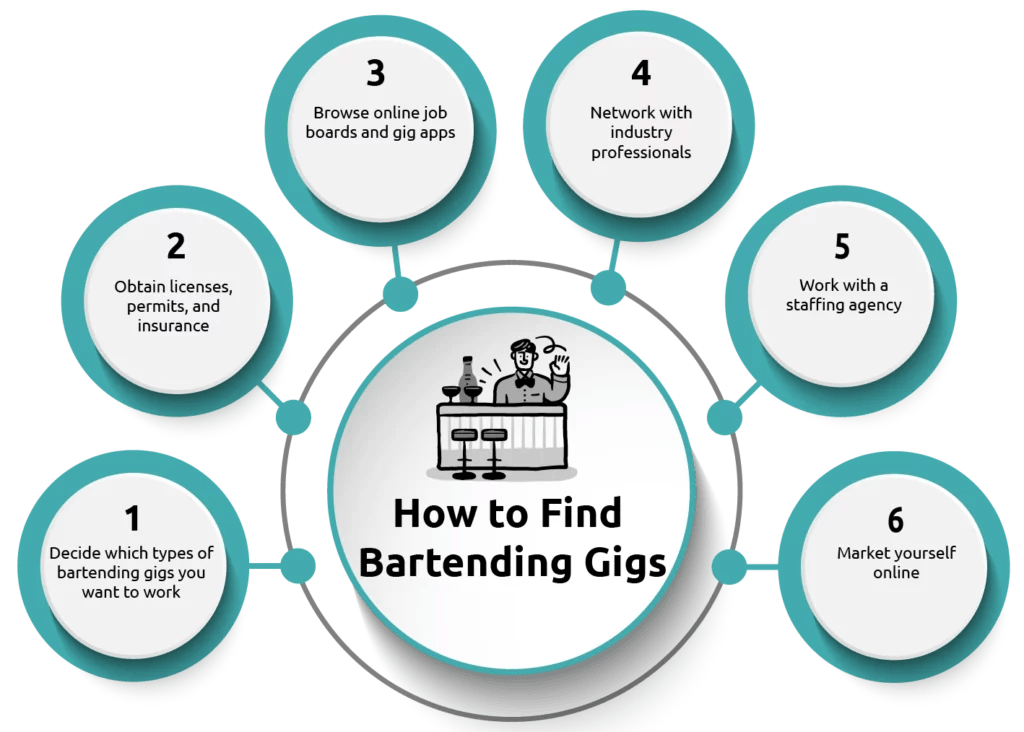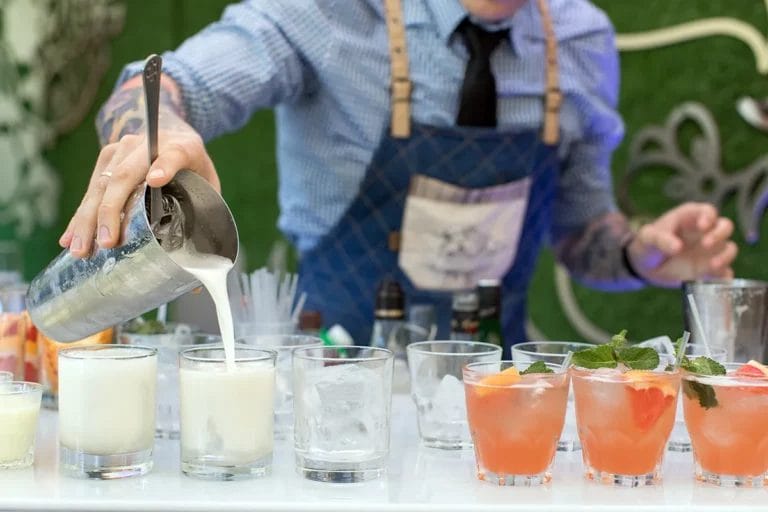Searching for jobs is a time-consuming process, and looking for freelance bartending gigs isn’t any different.
To help make this experience less daunting, here’s how to find bartending gigs:

1. Decide Which Types of Bartending Gigs You Want to Find
Gig bartenders have a variety of options regarding the kind of jobs they can book. This offers you flexibility in terms of work environments and the kind of clientele you serve.
Potential event bartending gigs include:
- Weddings
- Birthday parties
- Corporate parties
- Festivals
- Pop-up bars
- Anniversaries
- Holiday parties
- Sporting events
- Brand ambassadorships/product promotions
- Catering companies
- Event staffing agencies
Keep in mind that the kinds of gigs you work will affect the bartending gear you need to come prepared with, if any. If you’re freelancing for a staffing agency or a catering company, they may provide the equipment for you.
Pro Tip: New to the industry? Check out our guide to starting an event bartending business!
2. Get Your Credentials: Licenses, Permits, & Insurance
No matter what kinds of gigs you book, you are required to carry certain licenses and certifications to serve alcohol legally. In many cases, you will also need to show proof of insurance, and having this in place can help you find and land more bartending gigs.
Licenses and Permits
The exact requirements vary from state to state, but most bartenders need:
- Bartending license: Roughly half of the states in the U.S. require bartenders to carry a license to serve alcohol. Typically, this means taking and passing a state-approved course, such as ServSafe or Training for Intervention Procedures (TIPS) before your state will issue you a license.
- Liquor license: If you run a mobile bartending business or event bartending business, you will likely need a liquor license. Obtaining this usually involves providing proof of your residency in the state, your business registration, and proof of insurance.
- Food handler’s permit: Some states require bartenders to carry a food handler’s permit in addition to their bartending license. Check with your board of alcohol control to see which courses are approved by your state.
Bartender Certifications
In addition to these mandatory licenses, you can stand out from the competition when applying for gigs with these optional certifications:
- Mixology certification: Mixology courses give you in-depth knowledge about techniques, flavor profiles, and cocktail components. There are many different courses on the market, but Serving Alcohol Inc. and A Bar Above are popular options.
- Cicerone certification: There are four levels of cicerone certification, which you can use to market yourself as a true beer expert.
- Wine & Spirit Education Trust (WSET) certifications: WSET offers courses in beer, sake, spirits, and wines to level up your alcoholic beverage knowledge.
Gig Bartending Insurance
Insurance may not immediately come to mind as an important part of finding gigs, but many prospective clients, agencies, and event organizers will ask you for proof of insurance before they book you.
This is especially true if you live in a state with dram shop laws that hold bartenders liable for injuries and property damage caused by people they served. Even if you don’t live in a state with dram shop laws, you are still vulnerable to liability claims.
Having bartender insurance is the best way to shield your finances and protect your reputation from potential alcohol-related accidents. If someone you served drives home intoxicated and causes an accident, you could be held financially responsible for damages, medical bills, and more.
3. Browse Online Job Boards and Bartending Gig Apps
Many bartenders find jobs on the following job boards:
Of course, those sites post a wide variety of jobs that aren’t exclusive to bartenders or freelancers in the gig economy. Luckily, gig apps that cater to both gig workers and employers looking to hire gig workers can help you narrow down your search!
Some of the best gig apps for bartenders are:

4. Network With Industry Professionals
70% of people searching for jobs find employment through their network. While it might seem old-fashioned, forging connections with others in and around the industry is an effective way to find freelance bartending gigs.
Here are some ways you can build professional connections for referrals and job opportunities:
- Attending industry events: There are many different events bartenders can network at — food and beverage conventions, hospitality conventions, vendor expos (especially for weddings), and more.
- Join bartending groups on social media: You can source local gigs by joining bartending or event planning groups on Facebook, like Traveling Bartenders or Life Behind Bars. Potential employers often source candidates in groups like these, so check in often to see if anyone is posting gigs you would be interested in.
- Talk to former employers and coworkers: Reach out to previous colleagues to see if they have any job leads. (These existing contacts can also serve as excellent references for you when you’re interviewing for a gig!)
- Educational classes or workshops: If you strengthen your résumé with a mixology or wine certification, for example, talk to your classmates and connect with them on social media to stay in touch. They may be able to tip you off to opportunities before they hit the job boards.
5. Work With a Staffing Agency
Agencies can take the stress of searching for available gig bartending jobs off your plate. Working with an agency has other benefits for gig bartenders, including:
- Steadier access to available jobs
- A more reliable stream of income
- Connections to exclusive opportunities (corporate product launches, luxury private parties, etc.)
- Support and conflict mediation for issues that may arise (last-minute cancellations, staff shortages, security concerns, etc.)
If you want to use a staffing agency to find bartending gigs, you need to:
- Research agencies: There are nationwide agencies (like LGC Hospitality and Kelly Services) as well as local ones. Look for those that specialize in bartending or hospitality and read reviews from other bartenders to see what their experience was like.
- Apply online: Most agencies have online applications where you can upload your résumé and list your credentials and references. If they see you as a good match for current or upcoming opportunities, someone from the agency will contact you for an interview.
- Take any mandatory courses: Some agencies require you to complete training courses to meet their standards for bartending and customer service skills.
- Create your profile: Add a professional headshot, write a brief bio, and highlight your work experience and skills to attract job offers.
- Book gigs: Be professional and responsive to any offers or inquiries you get. Make sure the gigs you accept meet your standards for pay and understand what your expectations will be on the job.
6. Market Yourself Online
No matter what kind of event bartending gigs you want to book or how you plan to find them, you should plan to promote your services online. With the average person spending 40% of their waking hours online, having a digital footprint is critical to promoting yourself.
The most successful freelance bartenders have an online presence that includes a few different elements.
A Bartender Services Website
Your website is the hub of your digital footprint. Create a visual portfolio so potential clients can see what kinds of events you work and the beverages you specialize in.
Make sure you have a functional “Contact” section with a form where clients can reach out to request a quote or give you information about the event they want to book you for.
Social Media Profiles
To be professional and credible, your bartending business should have social media profiles that are separate from your personal accounts. They should focus entirely on highlighting your work experience and skills as a bartender.
Post pictures and videos of the drinks you make or of yourself making drinks to Facebook, Instagram, and TikTok.
Online Local Business Listings
An effective way to get your name out there as a freelance bartender is to be listed on platforms like Google Business Profile and Yelp. Both of these platforms can boost your ranking in search results when people look for bartenders in their area, and you can create profiles on both for free!
They also provide an excellent avenue for clients to leave reviews for you, which you can display on your website as testimonials. 85% of people trust local business reviews, so having some of your own can increase your legitimacy and chances of getting booked.

FAQs About Booking Bartending Gigs
Where Do Bartenders Make the Most Money?
According to Zippa, the highest-paying states for bartenders in the U.S. are:
- Hawaii
- Average: ~$36,000
- Range: $30,000–$43,000
- New Jersey
- Average: ~$33,000
- Range: $19,000–$58,000
- Washington
- Average: ~$32,000
- Range: $21,000–$48,000
- California
- Average: ~$32,000
- Range: $19,000–$52,000
- New York
- Average: ~$31,000
- Range: $18,000–$56,000
How Much Should I Charge for Bartending Services?
Whether you’re bartending weddings or corporate events, your bartending rates should be determined by the following factors:
- Operating costs like liquor, transportation, equipment, insurance, and licensing fees
- The market rate in your area
- Services you will be providing (beer and wine, full-service cocktails, etc.)
- The number of guests attending the event (you can charge gratuity for larger events)
- Your profit margin (generally 20% per pour)
How Do I Create a Contract for Bartending Services?
Your bartending services contract should include the names and contact info of all parties, scope of work (services provided, set up, teardown, supplies, etc.), event or gig details, cost, cancelation policy, and a place for both (or all) parties to sign and date the agreement.
How Can I Make My Profile Stand Out on Bartending Gig Platforms?
- Write an engaging headline (e.g. Mixing It Up With Style — Personalized Service for Every Occasion!)
- Use a professionally taken photo
- Include certifications and years of experience in your bio
- Display positive reviews and testimonials from previous clients
- Highlight special skills, such as signature cocktails, flair bartending, or expert knowledge
- Promote yourself as a fully licensed and insured bartender
- Be responsive to messages and inquiries

JoAnne Hammer | Program Manager
JoAnne Hammer is the Program Manager for Insurance Canopy. She has held the prestigious Certified Insurance Counselor (CIC) designation since July 2004.
JoAnne understands that starting and operating a business takes a tremendous amount of time, dedication, and financial resources. She believes that insurance is the single best way to protect your investment, business, and personal assets.
JoAnne Hammer is the Program Manager for Insurance Canopy. She has held the prestigious Certified Insurance Counselor (CIC) designation since July 2004.
JoAnne understands that starting and operating a business takes a tremendous amount of time, dedication, and financial resources. She believes that insurance is the single best way to protect your investment, business, and personal assets.





